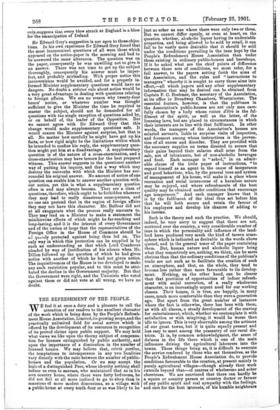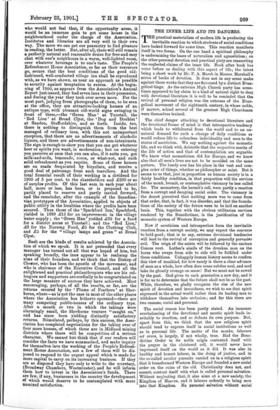THE REFRESHMENT OF THE PEOPLE.
WE feel it at once a duty and a pleasure to call the attention of our readers to the excellent character of the work which is being done by the People's Refresh- ment House Association, Limited, its growing scope, and the practically unlimited field for social service which is offered by the development of its resources in recognition of its proved claims upon public support. We may hold what views we like upon the thorny subject of compensa- tion for licenses extinguished by public authority, and upon the importance of a diminution in the number of licensed houses. We may believe that, ceteris paribus, the temptations to intemperance in any two localities vary directly with the ratio between the number of public- houses and the population. Or we may accept the logic of a distinguished Peer, whose identity nothing shall induce us even to canvass, who maintained that as in his own country house, where there were forty bedrooms, he did not feel at all more inclined to go to sleep than in mansions of more modest dimensions, so a village with a public-house at every tenth door or so was likely to be just as sober as one where there were only two or three. But we cannot differ openly, or even at heart, on the question whether, alcoholic liquor having its undeniable properties, and being allowed to be sold by retail, it can fail to be vastly more desirable that it should be sold under the conditions prevailing in the inns kept by the People's Refreshment House Association than under those existing in ordinary public-houses and beershops. If it be asked what are the chief points of difference between those sets of conditions, we must refer, for a full answer, to the papers setting forth the aims of the Association, and the rules and "instructions to managers" whereby it is sought to carry those aims into effect,—all which papers and any other supplementary information that may be desired can be obtained from Captain F. C. Boehmer, the secretary of the Association, at its office in Broadway Chambers, Westminster. The essential feature, however, is that the publicans in the Association's public-houses are not only men care- fully chosen by a body whose raison d'être is the ful- filment of the spirit, as well as the letter, of the licensing laws, but are placed in circumstances in which their interests are in line with that fulfilment. In other words, the managers of the Association's houses are salaried servants, liable to surprise visits of inspection, and foremost among whose instructions is the preven- tion of all excess and disorder. They are provided with the necessary supplies on terms directed to secure that their gains beyond their salaries shall arise from the sale, not of intoxicants, but of non-alcoholic beverages and food. Each manager is "asked," in an admir- able clause of the little paper of instructions, "to regard himself as an agent in the cause of temperance and good behaviour, who, by the general tone and system of management of his house, will make it a place where recreation and social intercourse of a harmless nature may be enjoyed, and where refreshments of the best quality may be obtained under conditions that encourage age temperance." And each manager knows that it is by the fulfilment of the ideal thus set before him that he will both secure and retain the favour of his employers and develop his chances of adding to his income.
Such is the theory and such the practice. We should, indeed, be very sorry to suggest that there are not, scattered over the country, a very considerable number of inns in which the personality and influence of the land- lord have produced very much the kind of tavern atmo- sphere which is indicated as desirable in the words above quoted, and in the general tenor of the paper containing them. But, human nature and alcoholic liquor being what they respectively are, nothing, we think, can be more obvious than that the ordinary conditions of the publican's trade are not such as to facilitate the creation of such an atmosphere, and that, on the whole, they tend to become less rather than more favourable to its develop- ment. Nothing, on the other hand, can be clearer than that provision of opportunities of indoor refresh- ment with social recreation, of a really wholesome character, is an increasingly urgent need for our working classes. Their homes, it is true, are happily, in many cases, much more comfortable than they were a generation ago. But apart from the great number of instances where the fact is otherwise, there has been with them, as with all classes, a steady development of the craving for entertainment, which, whether we contemplate it with satisfaction or with misgiving, it would be worse than idle to ignore. This is very observable among the artisans of our great towns, but it is quite equally present and less easy to meet among the peasantry of our rural dis- tricts. It is, by common acknowledgment, the sense of dulness in the life there which is one of the main influences driving the agricultural labourers into the towns. These things being so, it is difficult to overrate the service rendered by those who set themselves, as the People's Refreshment House Association do, to provide conditions favourable to the creation, at present mainly in purely agricultural villages—though already their work extends beyond that—of centres of wholesome and sober cheeriness. We are convinced that there can hardly be a squire or country parson or country doctor or farmer of any public spirit and real sympathy with the feelings, and care for the best interests, of his humble neighbours who would not feel that, if the opportunity arose, it would be an immense gain to get some house in the neighbourhood under the charge of the Association. Institutes and libraries are all very well in their own way. The more we can get our peasantry to find pleasure in reading, the better. But, after all, there will still remain a perfectly natural and reasonable desire for free and easy chat with one's neighbours in a warm, well-lighted room, over whatever beverage is to one's taste. The People's Refreshment House Association, so far as their resources go, secure that the best conditions of the good old- fashioned, well-conducted village inn shall be reproduced with, as we have shown, as near an approach as possible to security against temptation to excess. At the begin- ning of 1900, as appears from the Association's Annual Report just issued, they had seven inns in their possession, and during the year they took over seven more. For the most part, judging from photographs of them, to be seen at the office, they are attractive-looking houses of an antique type, with pleasant old-world signs swinging in front of them,—the Green Man' at Tan stall, the Red Lion' at Broad Clyst, the Dog and Doublet' at Sandon, Staffordshire, and so forth. Inside, too, there is nothing to distinguish them from the best managed of ordinary inns, with this not unimportant exception, that there are no advertisements of alcoholic liquors, and there are advertisements of non-intoxicants. The sign is enough to show you that you can get whatever beer or spirits you want, in moderation ; but on entering you perceive at once that you can also, if it suits you, get milk-and-soda, lemonade, cocoa, or what-not, and such solid refreshment as you require. Some of these houses are on roads frequented by bicyclists, and receive a good deal of patronage from such travellers. And the total financial result of their working is a dividend for 1900 of 5 per cent, to the shareholders and £200 or so of surplus profits. Of this last sum in each year about half, more or less, has been, or is proposed to be, partly placed to reserve and partly carried forward, and the remainder, after the example of the Scandina- vian prototypes of the Association, applied to objects of public utility in the localities where the profits have been secured. Thus those of the Sparkford Inn,' Sparkford, yielded in 1899 £15 for an improvement in the village water supply ; the Green Man' yielded £30 for a fund for a district nurse at Tunstall ; and the Red Lion,' £5 for the Nursing Fund, .E5 for the Clothing Club, and .£5 for the "village lamps and green" at Broad Clyst.
Such are the kinds of results achieved by the Associa- tion of which we speak. It is not pretended that every manager has turned out all that was hoped of him, but speaking broadly, the inns appear to be realising the aims of their founders, and we think that the Bishop of Chester, who has been the apostle of the movement, and who is chairman of the Executive Council, and all the enlightened and practical philanthropists who are his col- leagues and supporters are cordially to be congratulated on the large measure of success they have achieved. Most encouraging, perhaps, of all the results, so far, are the returns secured by the Plume of Feathers' at Sher- borne, where—as is not the case in most of the other places where the Association has hitherto operated—there are many competing public-houses of the ordinary type. After a month or two in which the takings were alarmingly small, the Sherborne venture "caught on," and has since been yielding distinctly satisfactory returns. Stimulated, perhaps, by this success, the Asso- ciation has completed negotiations for the taking over of four more houses, of which three are in Midland mining districts where there will be competition of a serious character. We cannot but think that if our readers will consider the facts we have summarised, and make inquiry for themselves into the working of the People's Refresh- ment House Association, not a few of them will be dis- posed to respond to the urgent appeal which is made for more capital to carry on its increasing business. If they are so disposed they have only to write to the secretary, (Broadway Chambers, Westminster), and he will inform them bow to invest in the Association's funds. There are few, if any, businesses in the country the development of which would deserve to be contemplated with more unmixed satisfaction.







































 Previous page
Previous page